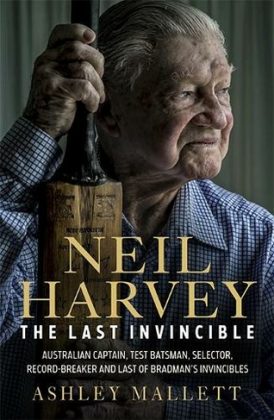The Last Invincible
Archie Mac |Published: 2021
Pages: 280
Author: Mallett, Ashley
Publisher: Hardie Grant Books
Rating: 3.5 stars

It has been almost 60 years since the last book on Neil Harvey was published. My World of Cricket was a book of its time. It followed the standard format of recently retired players, with the narrative almost entirely confined to match reports and the avoidance of any significant controversy. A lack of controversy is certainly not what you’ll find in the new biography of arguably Australia’s greatest ever left handed batsmen.
Harvey provides author Ashley Mallett with a candid view of his career and is forthright with his opinions. It seems that Harvey had always been straight up with his opinions and this appears to have contributed to his being overlooked for the captaincy when Ian Johnson retired after the 1956 tour. Johnson, who is described as an autocratic captain, was not impressed by the behaviour of either Harvey or Richie Benaud on the 1956 tour and wrote a negative report on both to the Australian Cricket Board.
That unflattering report appears to be the reason the far younger and much less talented batsmen, Ian Craig, and not Harvey was given the captaincy of Australia. Harvey described himself as being livid at the decision, but such is the man he gave Craig his full support. During Craig’s first tour as captain to South Africa his poor form saw him ask to be dropped. Harvey as a fellow selector ensured Craig remained as captain and played in all the Tests.
Much is made in The Last Invincible, of Harvey’s sportsmanship in this instance, in that he did not want to be involved in the first Australian captain ever being dropped, even though it meant Harvey would take over the hegemony role. However as an Australian selector it seems Harvey was the one who orchestrated the deposing of Bill Lawry as captain in 1971. Harvey explained that Lawry was removed for his negative captaincy. I would have liked to have known whether Harvey thought it fair that Lawry found out about his sacking from the media rather than the selectors.
Harvey was eventually removed as an Australian selector in 1979 for having a beer at the bar at the Adelaide Oval during play in a Test match. This seems overly harsh, although there were some concerns that Harvey did not rate players, such as Ian Redpath, as he used his feet to the spinners when blocking. Harvey believed that if you advanced to the spinning ball you should attack. This was certainly the way Harvey played, and he was loved by the crowds for it.
One surprising disclosure in the book was that Harvey believed Lindsay Hassett the best tactical captain he played under. You would assume he would have nominated Benaud, with whom he had such a productive relationship for so many years as Benaud’s vice captain. This validation should certainly raise the stocks of Hassett when the best Test captains are debated.
In The Last Invincible author Ashley Mallett, discloses that he’s a friend of Harvey, although this does not appear to stop some forthright opinions of the author being expressed. The book starts with the 1948 Invincibles tour under Don Bradman, before returning back to Harvey’s childhood. A nice feature is a short reminiscence of those close to Harvey at the end of each chapter – we hear from a wide variety of people, including Ian and Greg Chappell, Alan Davidson, and there are even some remembrances from Bradman and Benaud.
Mallett writes in a laidback conversational style and is certainly not afraid to express his own opinions throughout. There are a couple of annoying factual errors that have crept in, but they certainly don’t detract from the quality of the narrative. I thought I just about knew all there was to know when it came to the greatest left hander Neil Harvey, however I learnt many new things about him in The Last Invincible. I can heartedly recommend it to both the knowledgeable cricket fan as well as anyone who wants to be entertained by a great Australian sporting story.






Leave a comment